How Can Some Look at the Whole Family Tree on Ancestry
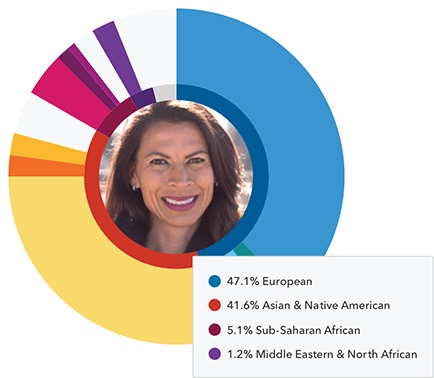
We are reinventing the way you see your ancestry — through science.
Your Deoxyribonucleic acid can tell y'all more
about your family history.
add to cart add to cart USD$99
Nosotros are reinventing the fashion you see your beginnings — through science.
Your DNA tin tell you more
near your family history.
add to cart add to cart USD$99

Discover more about your Dna story.
More regions. More than connections. More ways to discover what makes you, you.
Feel your ancestry in a
whole new way.
Click to explore our service below.
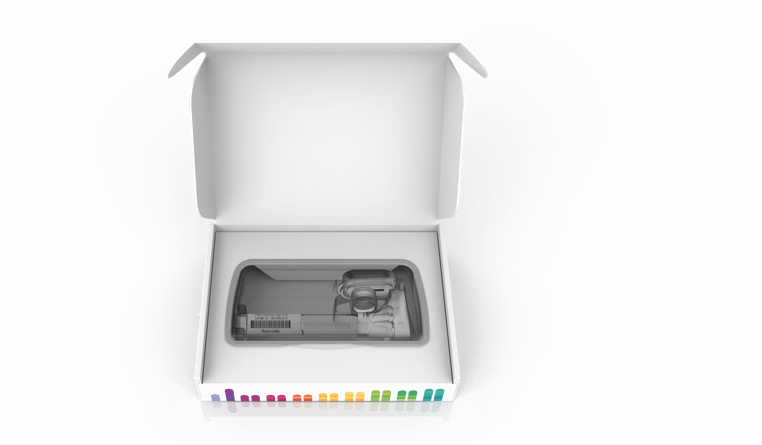
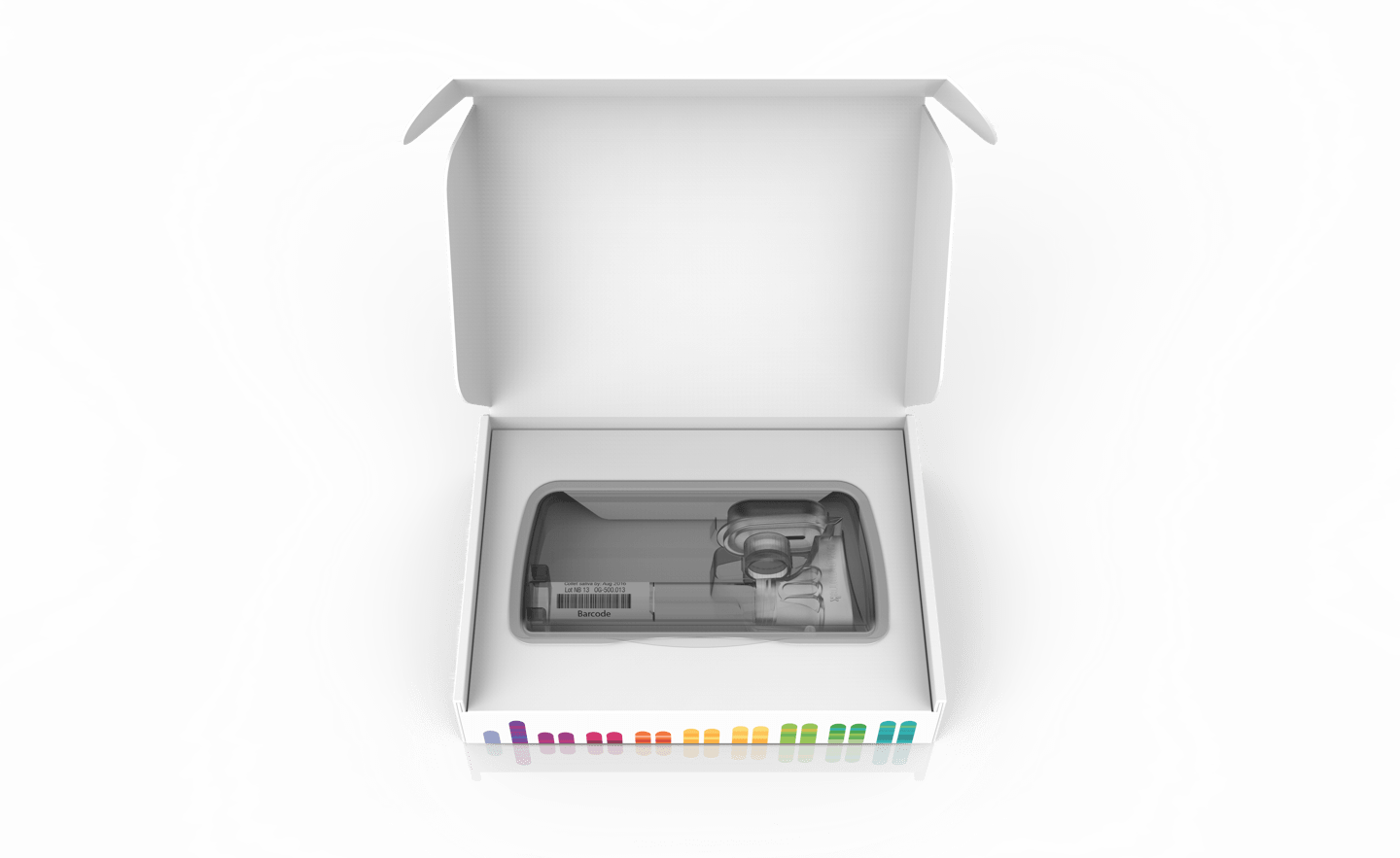
Now with 2000+ regions Ancestry Composition
Find where your DNA is from out of 2000+ regions worldwide - and more than.
Learn more than
Family Tree
Our Beginnings + Traits Service now includes our new automatic family tree architect.
Dna Relative Finder
Opt-in to connect with people who share Deoxyribonucleic acid with you - and message them.
Learn more than

Trait reports
Learn how your Dna influences your facial features, taste, smell and other traits.
Learn more
Maternal & Paternal Haplogroups
Trace parts of your ancestry to a specific group of individuals from 1,000+ years agone.
Larn more
Neanderthal Ancestry
Discover how much Neanderthal Dna you inherited.
Learn more

Now with 2000+ regions
Ancestry Limerick
See how your Deoxyribonucleic acid breaks out across our 2000+ regions worldwide.
- Learn most your ancestral origins.
- See where your ancestors lived 500+ years ago.
- Use your Dna findings to travel to the places that brand you, yous.
Learn more
Ancestry Composition
- Acquire about your ancestral origins.
- Run across where your ancestors lived 500+ years agone.
- Use your Dna findings to travel to the places that make yous, you.
Family Tree
- You don't accept to be a genealogist to build your family tree.
- Automatically beginning your family tree using your Deoxyribonucleic acid.
Deoxyribonucleic acid Relative Finder
Opt-in to connect with people who share DNA with you - and message them.
- Discover Deoxyribonucleic acid relatives from around the earth.
- Choose to message and meet relatives - maybe even hear new family unit stories, share photos and get a better understanding of your family's history.
Larn more

Trait reports
- Our Beginnings + Traits Service includes 30+ trait reports at no additional cost.
- Compare your results to other 23andMe customers.
Learn more
Maternal & Paternal Haplogroups
Trace parts of your beginnings to a specific group of individuals from 1,000+ years ago.
- Sympathise how the migration of our Dna tells the story of your ancestors.
- Learn the origins of your maternal and paternal* ancestors.
*Women tin only trace their paternal haplogroup by connecting to a male relative — such every bit a father, brother or paternal male cousin.
Learn more
Neanderthal Ancestry
Observe how much Neanderthal Deoxyribonucleic acid yous inherited.
- Find out how much of your DNA is derived from Neanderthals.
- Meet how your Neanderthal limerick compares to others.
- Learn which traits your Neanderthal DNA is associated with, like height and back hair.
Learn more
Experience your ancestry in a
whole new mode.
Click to explore our service beneath.
Ancestry Limerick
Haplogroups
Neanderthal Ancestry
Deoxyribonucleic acid
Relatives
Run across how your Deoxyribonucleic acid breaks out across our 2000+ regions worldwide.
- Learn about your bequeathed origins
- See where your ancestors lived 500+ years ago
- Run into how each of your biological parents contributed to your Ancestry Composition (feature available when connected with one genotyped parent).
Acquire more
Trace parts of your ancestry to a specific group of individuals from 1,000+ years ago
- Understand how the migration of our DNA tells the story of your ancestors
- Learn the origins of your maternal and paternal* ancestors
- Women can simply trace their maternal haplogroup
Learn more
Explore genetic similarities and differences betwixt you lot and your relatives
- See how different ancestries have traveled through generations of your family unit.*
- Requires relatives to be genotyped
- Share reports with family and friends (even if they are non customers!)
Detect how much Neanderthal DNA you lot inherited!
- Observe out how much of your Dna is derived from Neanderthals
- See how your Neanderthal composition compares to others
- Learn which traits your Neanderthal Deoxyribonucleic acid is associated with, similar height and back pilus
Learn more than
Opt-in to connect with people who share DNA with yous - and message them!
- Dna Relatives carousel copy
- Find DNA relatives from around the earth
- Choose to message and meet relatives - maybe fifty-fifty hear new family unit stories, share photos and get a better understanding of your family unit's history
Learn more
76-year-old woman finds
her nascency family after
a 40-year search
Play video
Where in the world is your Deoxyribonucleic acid from?
Your DNA tin tell you where your ancestors lived more than than 500 years ago. Explore your beginnings's breakdown by region, including Due east Asia, Sub-Saharan Africa and Europe, with results becoming more refined as our database continues to grow.
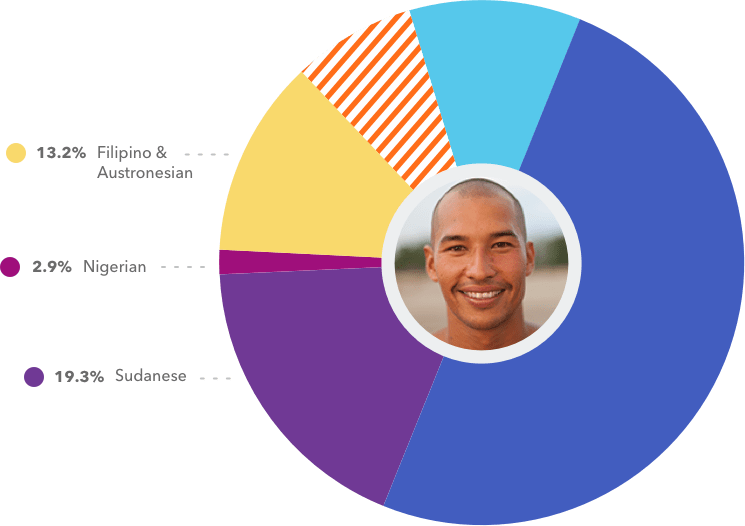

Trait Reports
30+ reports
Observe out your likelihood of having sure characteristics. See how your Deoxyribonucleic acid affects your hair color, sense of taste preferences and more than. You tin also compare your results to other 23andMe customers.
Reports include
- Hair: Color, Curliness, Male Bald Spot
- Taste & Aroma: Sweet vs. Salty, Bitter
- Facial Features: Cheek Dimples, Unibrow, Freckles
- See all traits
Take a closer look at a report.
Overview
See how likely you are to have the trait and how your prediction compares to other groups.
About the trait
Learn how the trait develops, how it evolved and other contributing factors.
Take action
Have the next step past sharing, comparing or learning more about your results.
What if y'all could travel at that place?
Learn more than about how you tin can commence on a DNA travel adventure based on your 23andMe Beginnings Limerick results.
Your Ancestry Timeline
Traced through the generations
Observe when different ancestries were introduced into your DNA. Learn how many generations agone yous had an antecedent that was descended from a unmarried population or ethnicity.
A new social network, with a genetic twist.
Explore your DNA Family! Nosotros all have our immediate, biological or adopted families...simply did you know yous could too share DNA with other 23andMe customers - your Dna Relatives?
With this unique (and bearding) report, see how many Dna Relatives you accept around the world - or here in the US! View all the places your Deoxyribonucleic acid Relatives call home.
And if you want to dig deeper, you tin opt-into our Dna Relatives tool to find, connect and message those who share DNA with you.
Find DNA relatives beyond the globe or across the street.
Find other 23andMe customers who share your Dna and ancestors. Explore matches that range from close family to distant relatives and make new connections. Shed new light on your family story by discovering a new relative nearby or somewhere effectually the world. You tin can ever cull to opt in or out of this tool.
The departure is in our DNA
Some of our nearly innovative ancestry features that allow you drill down into the details:
- Inheritance Tracing: Trace how sure populations were passed downwards through dissimilar generations – which is more interesting if you accept family members in the database
- Ancestry percentages to the 0.1%: We provide estimates of your ancestry percentages down to the 0.1%, and we too requite y'all the choice to explore results with different confidence levels
- Breakup of ancestry: See how your DNA breaks out across our 2000+ regions worldwide
- Compare Deoxyribonucleic acid Relatives' segments: In the Deoxyribonucleic acid Relatives tool, see overlapping chromosome segments between you and your matches and compare them with up to 5 other matches at a time to help you triangulate new relatives for your family tree
Map your ancestry.
Get further back.
Discover the origins of your maternal (your mother's mother'southward mother'due south…) and paternal (your father'southward father'south begetter's…) ancestors and how they moved around the globe over thousands of years.
Nosotros report on your maternal and paternal lineage past identifying your haplogroups. A haplogroup can trace part of your ancestry back to a specific group of individuals in the afar by.
Women tin can but trace their maternal haplogroup. This is because the paternal haplogroup is traced through the Y chromosome, which women do non inherit.
Information for women 
More on: results for women.
The vast majority of our features, including the Ancestry Composition report and DNA Relatives tool, are based on autosomal DNA. Autosomal Dna is inherited from both parents, and women receive all these reports and tools.
While men can trace both their maternal haplogroup (from mitochondrial DNA) and their paternal haplogroup (through the Y chromosome passed down from their father), women can only trace their maternal haplogroup (through the mitochondrial DNA passed down from their mother). This is because the paternal haplogroup is traced through the Y chromosome, which women do not inherit.
Keep in heed that haplogroups are one small-scale part of your beginnings assay. If a male relative such equally your father, blood brother, paternal uncle or paternal male cousin were genotyped, your own paternal haplogroup information could exist inferred from any of them.

Find out if yous're a little flake Neanderthal.
Even though Neanderthals vanished well-nigh forty,000 years agone, their DNA lives on in usa. Research tells us that they interbred with humans around 60,000 years ago.
23andMe can tell you how much of your DNA is derived from Neanderthals and how that compares to others. Nosotros tin can even point to specific Neanderthal Dna that is associated with traits that you might have – like elevation and back hair.
Hi. Still have questions about our ancestry features?
Here are just a few of the things people frequently ask virtually 23andMe.
If yous don't see your question hither, get in affect with us.
Some beginnings services are records-based, which means that they help y'all search historical records such equally birth, death and marriage certificates, to trace your lineage. 23andMe offers genetics-based ancestry reports and tools, which means that we clarify your DNA to trace your lineage.
With 23andMe, you can look deeper into your personal history to larn what percentage of your DNA comes from populations around the earth, find your Deoxyribonucleic acid relatives, learn about your maternal and paternal lineages and even run into how much of your DNA comes from Neanderthals.
The 23andMe Deoxyribonucleic acid database has more than five one thousand thousand genotyped customers worldwide. You lot will continue to notice new relatives every bit our database grows over fourth dimension.
Many people benefit from finding new family members – from those who fill in details of their family trees to adoptees finding their biological family unit.
If you opt in to Dna Relatives, y'all will exist able to transport and receive invitations to connect with other customers who share Deoxyribonucleic acid with you. Y'all can choose whether to respond to these invitations or not, and your DNA relatives take the aforementioned choice. We cannot guarantee that they volition respond to your sharing invitations or messages. Regardless of whether yous both agree to share, you will exist able to see their birthplace, locations of their ancestors and surnames, if they accept called to add together this information to their profile. If yous both accept sharing invitations, you volition be able to encounter ancestry reports and overlapping chromosome segments.
In rare cases, participation in Dna Relatives may reveal that you are related to someone unexpected, or that yous are not related to someone in the fashion that you lot expected. Consider this before you opt in to this feature.
Your beginnings results are based on a few different types of Deoxyribonucleic acid—DNA inherited from both of your parents (chromosomes i-22), Y chromosome Dna and mitochondrial Deoxyribonucleic acid.
DNA that you inherit from both parents is called autosomal Deoxyribonucleic acid. Since you inherit approximately one-half of this blazon of Deoxyribonucleic acid from each parent, information technology reflects contempo beginnings from both sides of your family unit tree. The vast majority of our features, including our Ancestry Limerick written report and Dna Relatives tool, are based on autosomal DNA.
Haplogroups are a different story. Your maternal line haplogroup assignment is derived from a split up piece of DNA called the mitochondria. Since mitochondria is passed on only past mothers to their children, your maternal line haplogroup consignment simply tells you nigh your female parent's side of the family. Similarly, the paternal line haplogroup assignment is derived from a different, separate piece of Deoxyribonucleic acid chosen the Y chromosome. The Y chromosome is merely passed from fathers to sons and but traces the paternal line.
Haplogroups are mainly used for doing anthropological research of time frames long before the adoption of surnames. Haplogroups are merely pointers to a large geographic area of the globe where that haplogroup is found in loftier frequency.
Some genetic ancestry services but provide autosomal Dna analysis or charge you separately for the maternal and paternal haplogroup information. 23andMe includes all of these for a unmarried price.
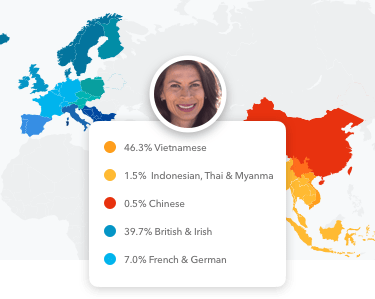
Discover more than almost
your Deoxyribonucleic acid story.
More regions. More connections. More means to notice what makes you, y'all.
Ancestry + Traits Service
USD$99

Ancestry Composition
Observe where your Deoxyribonucleic acid is from out of 2000+ regions worldwide - and more.
Your DNA can tell you where your ancestors lived more than 500 years ago. Explore your ancestry'south breakdown past region, including East Asia, Sub-Saharan African and Europe, with results becoming more than refined equally our database continues to grow.
What if you could travel in that location? Learn more than about how yous tin can embark on a DNA travel gamble based on your 23andMe Ancestry Composition results.

Trait reports
Learn how your Dna influences your facial features, taste, smell and other traits.
30+ reports
Find out your likelihood of having sure characteristics. See how your Dna affects your hair color, sense of taste preferences and more. You can too compare your results with other 23andMe customers.
Reports included
- Pilus: Color, Curliness, Male Bald Spot
- Taste & Odour: Sweet vs. Salty, Bitter
- Facial Features: Cheek Dimples, Unibrow
- sample study
- Ability to Match Musical Pitch
- Asparagus Odor Detection
- Back Hair (available for men only)
- Bald Spot (available for men just)
- Bitter Sense of taste
- Bunions
- Cheek Dimples
- Cilantro Taste Disfavor
- Cleft Chin
- Dandruff
- Earlobe Type
- Early Hair Loss (available for men simply)
- Earwax Type
- Eye Colour
- Fear of Heights
- Fright of Public Speaking
- Finger Length Ratio
- Apartment Feet
- Freckles
- Hair Photobleaching (hair lightening from the sun)
- Hair Texture
- Pilus Thickness
- Ice Foam Flavour Preference
- Light or Nighttime Hair
- Misophonia (hatred of the sound of chewing)
- Musquito Bite Frequency
- Motion Sickness
- Newborn Hair
- Photic Sneeze Reflex
- Red Hair
- Skin Pigmentation
- Stretch Marks
- Sugariness vs. Salty
- Toe Length Ratio
- Unibrow
- Wake-Upwardly Time
- Widow's Meridian

Deoxyribonucleic acid Relative Finder
Connect with people who share DNA with you.
Observe other 23andMe customers who share your DNA and ancestors. Explore matches that range from shut family to distant relatives and make new connections. Shed new light on your family unit story by discovering a new relative nearby or elsewhere around the world. You can always cull to opt in or out of this tool.
Expand content
Maternal & Paternal Haplogroups
Trace parts of your ancestry to a specific group of individuals from i,000+ years ago
Detect the origins of your maternal (your mother's mother's female parent's…) and paternal (your male parent's father's male parent's…) ancestors and how they moved around the world over thousands of years.
We report on your maternal and paternal lineage by identifying your haplogroups. A haplogroup tin can trace part of your ancestry back to a specific grouping of individuals in the distant past.
Women can only trace their maternal haplogroup. This is because the paternal haplogroup is traced through the Y chromosome, which women do non inherit.
More than nigh results for women
The vast majority of our features, including the Ancestry Composition report and DNA Relatives tool, are based on autosomal Dna. Autosomal Dna is inherited from both parents, and women receive all these reports and tools.
While men tin can trace both their maternal haplogroup (from mitochondrial Deoxyribonucleic acid) and their paternal haplogroup (through the Y chromosome passed down from their father), women can just trace their maternal haplogroup (through the mitochondrial DNA passed downward from their mother). This is because the paternal haplogroup is traced through the Y chromosome, which women do not inherit.
Continue in mind that haplogroups are i small part of your ancestry analysis. If a male relative such as your father, blood brother, paternal uncle or paternal male cousin were genotyped, your ain paternal haplogroup data could exist inferred from any of them.

Neanderthal Ancestry
Discover how much Neanderthal DNA you lot inherited
Even though Neanderthals vanished about xl,000 years ago, their Dna lives on in us. Research tells us that they interbred with humans around 60,000 years agone.
23andMe can tell you how much of your DNA is derived from Neanderthals and how that compares to others. Nosotros can fifty-fifty betoken to specific Neanderthal DNA that is associated with traits that you lot might accept – like height and back hair.
Raw data included 
Raw data is for information purposes only; must non be used for medical or diagnostic purposes.
yimhatemselithe1943.blogspot.com
Source: https://www.23andme.com/en-int/dna-ancestry/
0 Response to "How Can Some Look at the Whole Family Tree on Ancestry"
Post a Comment